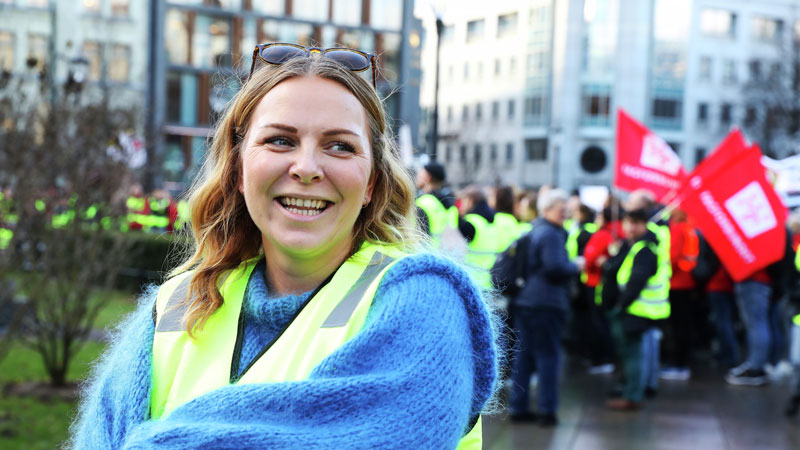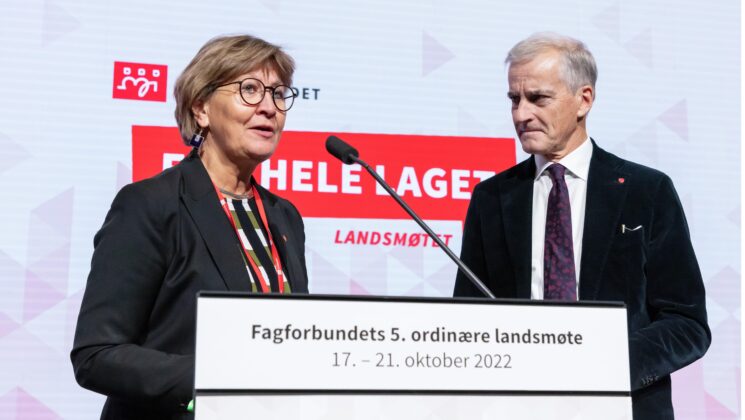Norwegian trade union leader Mette Nord, with the country’s prime minister Jonas Gahr Støre. Image: Werner Juvik
UNISON’s campaigning work doesn’t simply have its eye on the present, but the future – a positive vision of what public services, and UK society in general could be.
But for our hopes and ambitions to be fulfilled, there needs to be a like-minded government in office, with progressive views about both trade unions and public service provision.
For an example of the difference a government can make, in recent times, we only need to look across the North Sea, to Norway.
We spoke to two Norwegian trade unionists about working through eight years of a non-co-operative, right-wing government, and the progress they’ve made over the 18 months since a Labour/Centre coalition came into power.
Mette Nord (pictured above) is president of Fagforbundet, a Norwegian public services union that is similar to UNISON. She took over as leader of the union in 2013, shortly after Erna Solberg formed a coalition government of the centre-right Conservative party and ‘further right’ Progress party.
Her colleague, Berit Tevik, has been the leader of Fagforeningen – a subsection of Fagforbundet – for three years. Fagforeningen has 11,000 members across Oslo, who work in kindergartens, after school programmes and many children’s services.
Then: working with an uncooperative government
“For eight years it was a big challenge, because there was hardly any co-operation with the government at all,” says Mette.
“It was a big change for us. We have a long, long tradition in Norway of ‘tripartite’ work, with employers, political leadership and the unions, all co-operating to solve the big issues and challenges. Even with old Conservative governments, the ‘tripartite’ working stayed strong. But it was weakened over the eight years with Solberg.”
Many of the priorities and policies of the Solberg cabinet will sound familiar. “We experienced a liberalisation of the structure which organised public services, because they wanted to make it easier to privatise,” she says.
“They did that with words that were very positive – saying, ‘It should not be a public monopoly, as a free person you should be able to choose where you want to have your services delivered.’ In that context, they managed to privatise a lot and gave a kind of free enterprise for commercial companies in health and social services.”
When any individual opts for private health care, the public service has to pay for that delivery, she says.
“So, if I want to be treated by a private company, my local hospital has to pay for that. It was impossible for the public services to make a budget, because they didn’t know how many would use that possibility.”

Image: Birgit Dannenberg
Berit (pictured above) recounts the effect of this liberalisation in Oslo. “In Norway, we had a change in the law which meant that every family was entitled to a place in the kindergarten. So, they had to build a lot of kindergartens. And then they opened it up for private companies to own these kindergartens. Now, I think we have members in about 100 employers in the city.”
All of this had a knock-on effect for the workforce, as privatisation went hand in hand with a relaxation of the laws around part-time and temporary work.
In Norway, the government doesn’t deal with pay, it is the responsibility of unions and employers. Much of the time this is built on collective agreements, which are much more difficult to establish and maintain in privatised and fragmented sectors.
Mette says: “By allowing more temporary work, the government reduced the power of employees and unions. If you don’t have a permanent contract, you have to do what the employer says, you are totally in their hands.”
Elections
In the run up to the 2021 election, Mette says, “Fagforbundet had good co-operation with the left-wing parties. So during the campaign and in the manifestos from the parties, we already had promises for permanent and full-time job security and more spending for public services, municipalities, elderly care and pensions.”
She emphasises that their top priority was sorting out the issue of job security and part time, zero-hour contracts. “We organise a lot of women in the care sector, and 78% of them worked on part-time contracts, and so that was the biggest issue for us. Fixing that was in the manifestos.”
And now: a new government
Jonas Gahr Støre formed a coalition government, in October 2021, consisting of the Labour Party and the Centre Party. Straight away, the new government reverted to Norwegian tradition and recommenced the ‘tripartite’ working relationship alongside the unions.
Mette says: “We were invited to co-operate, and it was important that some of the advisors for the cabinet and the state secretaries were from the unions. So we had a direct line.”
Almost immediately, the government put forward proposals to restore elements of job security into law. They established pension rights from the first penny that was earned, rather than from after three years, and also restored the right to a full-time job.
“Zero-time contracts are now history,” Mette continues. The assumption now is that every job is full-time, with the burden required to prove that a role is ‘worth’ only part-time status on the employer’s shoulders.
“The power between employer and employee is more equal with Støre’s cabinet than it was under Solberg,” she says.
On top of that, the government has strengthened the balance of power between unions, employers and the government, because it believes that balance “is a part of solving problems in this country.”
In Norway, union membership density is relatively high, with around 80% of public service workers being union members and around 40% of the country’s total workforce. Even so, the new government has brought in rules to allow much of the cost of union membership to be written off in tax relief.
People, not profits
The government has also taken steps to begin unpicking the web of privatisation. When public contracts go out for tender, there is now an expectation that those services will be brought back into the public sector. For Fagforbundet, this anti-privatisation drive has a direct link to improving the quality of services.
In the care sector in the municipalities, for example, working groups determine how they can reduce the number of commercial companies that deliver services.
And in kindergartens, Berit says: “It’s a work in progress, I don’t think anybody could fix it overnight, the lobby for private kindergartens is strong. However, the new families minister has introduced some law changes which will make it more difficult for private companies to extract money out of the system.
“Even though kindergartens have a private company that owns them, the public funding that goes into them should stay in the welfare system,” she adds. “That’s a big change, because with that money we can also change the sector, by having more employees or better pay.”
As a result, the government has been able to introduce free after-school programs for first and second grade students.
In the healthcare sector, it is providing cheaper dental care for young adults. Moreover, the move toward full-time work has had a real an impact on staffing levels, and services.
All of this points to an attitude which prioritises people, not profit. Mette says: “Under Solberg, it was a case of cutting welfare to pay for the tax relief of the rich. Now we don’t have those tax breaks.
“They have increased taxes for the richest and for companies and have also provided tax relief for ordinary people on ordinary incomes, as well as increasing social security for those not able to work and for those with children.”
Moving forward
While both Berit and Mette are very positive about the steps that have been taken so far, they appreciate there is much more work to be done, and that it is the change in attitude toward ‘tripartite’ co-operation that will herald further progress.
For Berit, “The most important thing about having politicians who fight for the same causes that we do, is that they want to have meetings with us, they want to listen to us.
“That doesn’t mean they’re always going to do what we want, but we can have discussions about what is important for us and for the members.”
When asked what advice she would have for trade unions in the UK, Mette says: “You have to build co-operation on trust and you have to take responsibility that we – the trade unions – will do a lot of work, but then they – the government – have to do theirs. And if we are going to work as equal parts then we also need to see the results afterwards.
“Oh, and it’s very important to win the election!”




